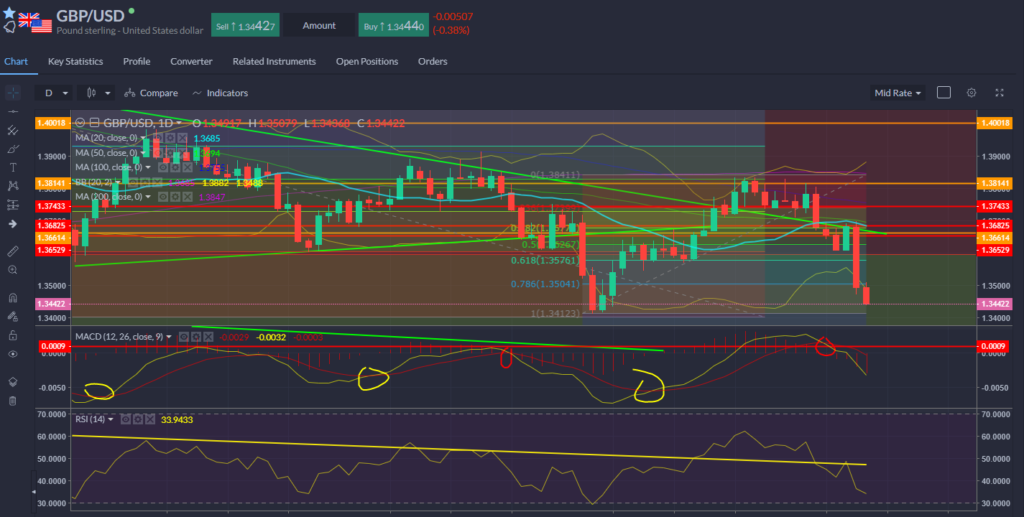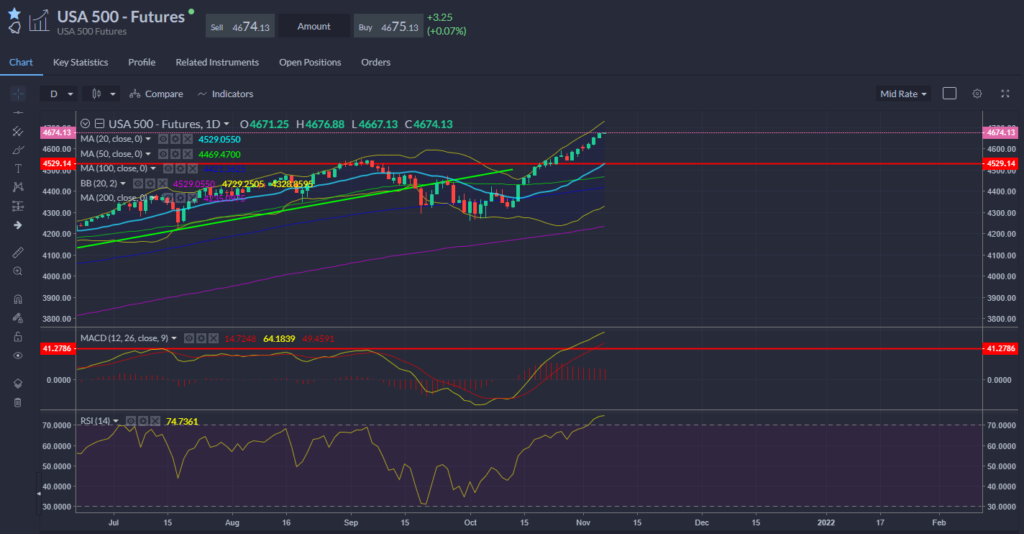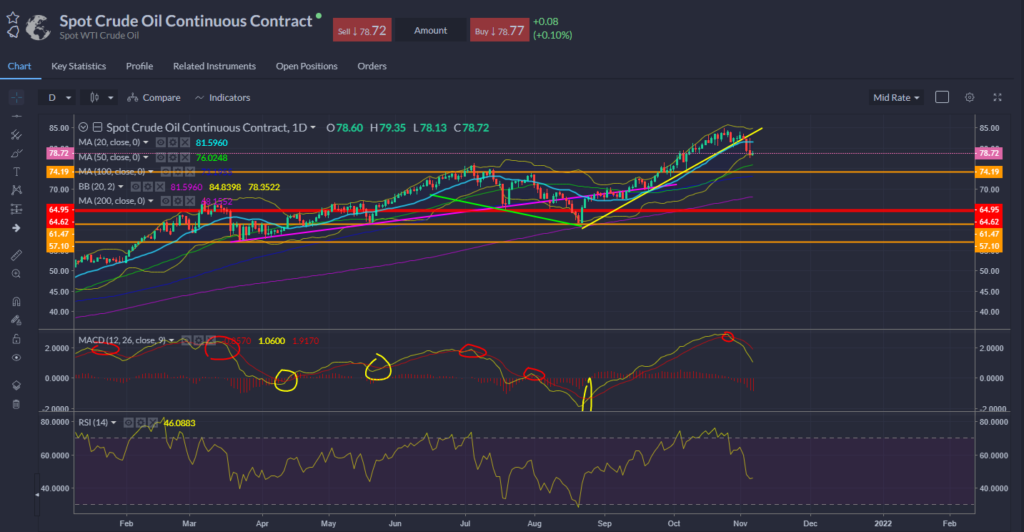
Friday Nov 5 2021 09:42

8 min
A key part of the central banker role is communication. Meetings take place infrequently, maybe 8 times a year, so in the gaps in-between, when trading days are long, markets lust for guidance in other forms. Policymakers are generally free between meetings to make speeches, give Q&As, do TV interviews etc. Sometimes they are compelled by lawmakers to explain their policies, too. Naturally what they say is comprehended, dissected and assessed by the market as to what their words imply for the course of monetary policy. There is never an absolute: nobody will say ‘we are going to raise rates next month’. That is why you have the meeting and produce an official statement. But you can make it clear to the market what you think about the state of things and where you think is the likely or appropriate course of monetary policy.
After an uneasy start in his job, Jay Powell, the Fed chairman, is very good at doing this. Perhaps not quite as adept as Mario Draghi at carefully steering market expectations, but close. He has spent six months painstakingly guiding the market to expect this week’s announcement on tapering asset purchases. No tantrum, barely much of a reaction even. Talk of rate hikes is scorned.
Contrast this with the performance of Andrew Bailey, the relatively new head of the Bank of England. Loose – in retrospect – remarks over recent weeks led the market to expect an interest rate rise yesterday, only to be confounded by not just a failure to deliver on that but an apparent indifference to the fact that policy was so poorly communicated. “It is not our responsibility to steer markets on interest rates,” he said. Oh, right? That’s kind of the antithesis of the job description, but you’re the man in the hot seat I suppose.
Frequently handing over to Broadbent and Ramsden to answer questions he seemed unable to tackle, Bailey’s remarks were problematic. For example, he cautioned on the scale of rate bets seen in markets – saying he thinks the market has priced in too many rate rises. Maybe he shouldn’t have been stoking those expectations with hawkish remarks on inflation. Then, in response to a later question about whether the market was right or wrong, he said: “None of us are going to endorse the market curve at any point in time.” That is just untrue. Michael Saunders on Oct 9th: “I think it is appropriate that the markets have moved to pricing a significantly earlier path of tightening than they did previously.” In response to a question about stagflation he rambled on about its etymology, said the bank doesn’t really use that word, so no before handing over to someone else to actually attempt an answer to the question. Even if you don’t use the word ‘stagflation’, you know the question is about falling growth and higher prices.
It seems like the BoE thinks ‘we’ll say something and the market can make of it what it likes, that’s not our business”. To a degree, that’s true. You can’t account for what others make of your statements. But you can be a lot more careful about those statements in the full knowledge that the market will read something into them since you are the governor of the Bank of England and not just anybody. There were several opportunities in recent weeks to lean against the aggressive market pricing, to gently nudge the market in the right direction, but the governor elected not to do that. The feeling is now that the BoE under Bailey has lost credibility and we will not be able to read as much into his remarks as we have done. This is not a good situation for a central banker to be in. I leave you with this, among the listed candidate requirements from the BoE’s job spec for Governor: “The ability to communicate with authority and credibility internally, to Parliament, the media, the markets and the wider public.”
Anyway, is the December meeting live? Citi and others think so, expecting a 15bps hike at the next meeting. Bailey said the vote at 7-2 was ‘close’, which maybe hints at several members – as I suggested may be the case yesterday – being close to swinging towards hiking but were not persuaded this week. Or not…it’s hard to tell these days. This morning on Today the governor said the BoE would not ‘bottle it’ when it came to raising rates and insisted they will rise. He also said that the Bank wants more time to assess the impact of the end of furlough on the labour market, and that this was the primary reason for not hiking rates yesterday. This could certainly indicate that Dec is ‘live’, since the Bank would not have had time to gauge the scarring, which so far looks small. But, then again, it might not.
Sterling got hit hard and is lower again this morning. GBPUSD blew through the 61.8% retracement area we’d highlighted at the start of the week and looks to retest 1.3410 September low and possible round number support at 1.340. This may mark the bottom though in the medium-term – if not then look to 1.3180, the 38.2% retracement of the 2020 low to 2021 high.

European stock markets are mixed, showing a bit of caution ahead of today’s nonfarm payrolls print in the US. The FTSE 100 is up again and north of 7,300 as the softer pound appears to be delivering a bit of a boost as we witnessed in the aftermath of the Bank of England announcement yesterday. The DAX is flat but the Euro Stoxx 50 is up 0.3%. The dollar is firmer with DXY at 94.40, yields steady with 10s around 1.53%, and gold bashing its head against the $1,800 resistance again support by lower real rates.
Wall Street rallied for a 6th straight day, with the S&P 500 and Nasdaq both notching fresh record highs. The Dow Jones slipped back as financials struggled, with GS and JPM leading the index lower. Broadly speaking the Fed’s patient approach and the removal of any overhanging worry around the tapering is good for risk, whilst fundamentals in the form of earnings are positive. Both US and European equities are trading at record peaks.
We said at the start of the week that the coming days were a big test for central banks. Have they passed that test? After the blowout in the bond market, the spike in front-end yields, central banks have not this week been as hawkish as some feared. Is that a failure to grasp the inflation snake? Maybe, I tend to think so, but many believe that central banks are right to be patient since the inflation is not just a function of demand this time. The transitory inflation narrative remains, and the CBs didn’t really pull the trigger and continue to err on the side of caution.
Shares in Peloton cratered by a third in after-hours trading after it reported a wider-than-expected loss. Pinterest was up 6% after a decent beat, whilst Uber fell after its loss was larger than forecast. Airbnb delivered record quarterly revenues and earnings. The firm posted $2.24bn in revenues versus the consensus of $2.05bn, whilst net income surged 280% to $834m.
The S&P 500 looks a tad overextended however and ripe for a pullback. The 20-day SMA has been a good anchor and a retreat to this area at 4530, a drop of 3% roughly, could be achieved without upsetting the longer-term trend.

Oil prices plunged as Saudi TV reported the country’s oil output would top 10m bpd by December. OPEC+ committed to raising output at 400k bpd, resisting calls from the White House to do more. Speculative positions are being unwound and the market is starting flip from draws to builds. Reuters reported Saudi energy minister Prince Abdulaziz bin Salman as saying that oil stocks will see “tremendous” builds at the end of 2021 and the start of next year because of slowing consumption.
Wide day for crude prices on Thursday highlighted by the $5 candle. Bearish MACD crossover still in charge.

